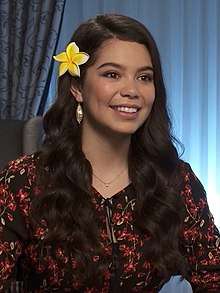Disney Character Voices International
Disney Character Voices International, Inc. is a corporate division of The Walt Disney Company with primary responsibility for the provision of translation and dubbing services for all Disney productions including those by Walt Disney Studios Motion Pictures, Disney Music Group and Disney Media Distribution. This division also supervises dubbings for Disney theme parks and derived games. An office of the division is present in several countries around the world.[1][2][3]
| Dubbing Disney products | |
| Founded | 1988 |
| Founder | Michael Eisner |
| Headquarters | United States, Walt Disney Studios (Burbank) |
| Owner | The Walt Disney Company |
History
The first dubbing issued for a Disney movie was Snow White and the Seven Dwarfs, supervised by Walt Disney himself.[4] The movie was originally distributed in 1938 in 10 languages: Brazilian Portuguese, Czech, Danish, Dutch, French, German, Italian, Latin American Spanish, Polish and Swedish.[5] Disney expressed his appreciation for this latter dubbing, revealing to Tatiana Angelini, Swedish voice of Snow White, she was his personal favorite international voice for the character.[6] Despite the fascist regime ruling Italy at the time, the movie premiered at the 6th Venice International Film Festival, winning the Grand Art Trophy special award.[7][8] Otherwise happened with the German version, for which the Walt Disney Company and Nazi Germany couldn’t find an agreement, so the German dubbing meant to be distributed in Austria and German-speaking Switzerland was made in Amsterdam, voiced by German refugees fled from their country.[9]
The real turning point for Disney dubbings occurred in the 40s, especially with the movie Fantasia, when Jimmy Johnson named Jack Cutting, Disney animator since 1930, responsible for the dubbing of Disney movies mainly in Danish, Finnish, French, German, Italian, Japanese, Norwegian, Portuguese, Spanish and Swedish. The DCVI affiliate branch itself was founded in January 1988, while Michael Eisner was in Paris for preparations to build Disneyland Paris (known at the time as Euro Disney Resort). On that occasion, he got to listen to the French dubbing of the series The Golden Girls and discovered several flaws and mistakes both in the translation and the dubbing. This realization, combined with Roy Disney’s disappointment with the French voice of Mickey Mouse, led Eisner to set up a dubbing department, directed by Roy Disney.[10][3][11]
Cast selection

To keep the whole production under control, Disney has established a centralized system that allows to gather on the same platform auditions by actors all over the world, which gained the Walt Disney Company the 2017 Technology and Engineering Emmy Awards.[3][12] Rick Dempsey, Senior Vice President of DCVI, said that the decision process to cast voices for Disney products works so that he specifically makes the decision on the cast from countries that make the top 14 percent of the box office, which sets the blueprint of the character’s voice with the director of the particular language hub. Local offices placed in countries whose voices are directly selected by DCVI will have competence over a specific geographical area, and they will cast the rest of the region in comparison to the selected voices. According to Dempsey, the voices do not have to be identical to the original English voices, but they must rather match the character, letting them shine through. Especially since 00s, local celebrities can sometimes be chosen for their appeal to their respective market more than their ability to match or accentuate the character, to make the movie more appealing to the specific audience.[3][11]
Languages
Disney movies are usually released in theaters in a set of languages, which varies depending on the product. Most languages covered by DCVI are fixed and all Disney animated movies are systematically dubbed and distributed in these idioms. However, there are languages covered by the departement on an irregular base, which varies depending on the movie.
Dubbings systematically released
Snow White and the Seven Dwarfs, first Disney animated movie to be distributed to other markets, was originally dubbed into 10 languages, besides English.[5] Over the years, the set of languages covered by DCVI has expanded, with a typical animated tentpole being nowadays distributed in theaters in 39 to 43 territories, an average live-action movie numbering 12 to 15 languages, and a four-quadrant live-action film like Pirates of the Caribbean being dubbed into about 27 tongues.[13] The number of languages involved in the dubbing process varies in accordance with the kind of product, with animation movies covering the largest number, and it has expanded throughout the years.
|
1938-1988 |
1988-1990s
|
2000s-2010s |
Dubbings irregularly or occasionally released


Some languages are usually released on an irregular base, which sees dubbings in the same language being issued sometimes together with the rest of systematic dubbings, and some other times at a later date, usually not for theaters, but directly on TV or streaming services. That's the case with Malay, Indonesian, Hindi, Tamil and Telugu. For instance, when the movie Frozen was released in 2013, it numbered a Malay dubbing among the 42 originally issued,[14] while a Hindi and an Indonesian versions were released only two years later.[15][16] When the sequel had its theatrical release in 2019, a Hindi, Tamil and Telugu versions were made, while no Malay or Indonesian dubbings exist yet.[17][18][19][16] Some other languages number only one or few dubbings, due to attempts to expand the market to new languages, like in the case of Austrian German, Bengali or Marathi dubbings. Finally, there's a group of one-time special dubbing languages, usually dedicated to the culture who served as a source of inspiration for the movie. The first instance of such a case was The Lion King, which received a special Zulu dubbing.[20] The next case had to wait until the movie Moana was released in 2016, which received a total of three special dubbings in Polynesian languages in the space of two years from its original release date.[21][22][23] Following upon the success of these three productions, a special Northern Sami dubbing was also made for the movie Frozen II, while no dubbing in this language was made for the first chapter of the series.[24] A peculiar case in one-time dubbings was the Navajo version of Finding Nemo released in 2016, in collaboration with the Navajo Nation Museum. Differently from the rest of special dubbings, the movie is not linked in any way to the Navajo culture, and yet it was chosen as a means to preserve Navajo language, teaching it to kids through a popular Disney movie.[25]
|
Irregularly issued: |
Occasionally issued: |
Special editions: |
Notes
- Until the Iranian Revolution began, then Persian dubbings were abandoned.
References
- "With Disney Character Voices International (Sorted by Popularity Ascending)". IMDb. Retrieved 2020-06-01.
- "Disney en France - Studios". mapage.noos.fr. Retrieved 2020-06-01.
- "Meet Rick Dempsey". disneyexaminer.com. Retrieved 2017-04-08.
- "« Un doublage réussi, c'est un doublage qui se fait oublier » | Facebook". www.facebook.com. Retrieved 2020-06-01.
- "Snow White". CHARGUIGOU (in French). Retrieved 2020-06-01.
- "Snövits röst har tystnat". www.expressen.se (in Swedish). Retrieved 2020-06-01.
- "ASAC Dati: Ricerca avanzata film". asac.labiennale.org. Retrieved 2020-06-01.
- "AntonioGenna.net presenta: IL MONDO DEI DOPPIATORI - ZONA CINEMA: "Biancaneve e i sette nani"". www.antoniogenna.net. Retrieved 2020-06-01.
- "ANNO, Österreichische Film-Zeitung, 1938-01-07, Seite 2". anno.onb.ac.at. Retrieved 2020-06-01.
- "MEDIA MAGIC: DISNEY CHARACTER VOICES INTERNATIONAL: Entretien avec le directeur créatif Boualem Lamhene". Retrieved 2020-06-01.
- "Making Movie Magic in Any Language". D23. 2016-12-16. Retrieved 2020-06-01.
- "The Walt Disney Company Receives 2017 Technology & Engineering Emmy Award". Television Academy. Retrieved 2020-06-01.
- "Inside the Weird World of International Dubbing". The Hollywood Reporter. Retrieved 2020-06-01.
- Various artists, Let It Go The Complete Set, retrieved 2020-06-02
- "Sunidhi Chauhan | Fanaa Ho Music Video | Frozen On Disney Channel". YouTube.
- "Elsa". CHARGUIGOU. Retrieved 2020-06-02.
- "Sunidhi Chauhan, AURORA - Anjaan jahaan (From "Frozen 2"/Audio Only)". YouTube.
- "Ramya Behara, AURORA - Nee maaya val lo (From "Frozen 2"/Audio Only)". YouTube.
- "Shruti Haasan, AURORA - Izhukkum Maayoll (From "Frozen 2"/Audio Only)". YouTube.
- "Various - The Lion King = Inkosi Ubhubesi". Discogs. Retrieved 2020-06-02.
- "'Moana' to be First Disney Film Translated Into Tahitian Language". Entertainment Weekly's EW.com. Retrieved 2016-11-14.
- "Moana in Māori hits the big screen". RNZ. 2017-09-11. Retrieved 2020-06-02.
- "Disney's Moana to make World Premiere in ʻŌlelo Hawaiʻi at Ko Olina's World Oceans Day, June 10". Ko Olina. Retrieved 2020-06-02.
- Idivuoma, Mariela (2019-11-20). "Dette er de samiske Disney-stjernene". NRK. Retrieved 2020-06-02.
- "Navajo Version of 'Finding Nemo' Aims to Promote Language". YouTube.
- "Indian". CHARGUIGOU (in French). Retrieved 2019-07-27.
- "Disney animation films in Marathi | WRelax". 2016-11-17. Archived from the original on 2016-11-17. Retrieved 2020-04-12.
- "Moana Hawaiian Translation Project | Academy for Creative Media System". Academy for Creative Media System. 2017-08-08. Archived from the original on 2017-11-01. Retrieved 2017-11-05.
- Speak Māori (2017-06-08), Te Reo Māori Moana Casting, retrieved 2017-07-14
- "Navajo Version of 'Finding Nemo' Aims to Promote Language", YouTube, 2014-12-22, retrieved 2014-12-22
- Milligan, Mercedes (2019-07-19). "'Frozen 2' Will Get Sámi Language Version". Animation Magazine. Retrieved 2019-07-27.
- "Inkosi Ubhubesi / The Lion King Zulu Voice Cast". WILLDUBGURU. Retrieved 2019-05-18.